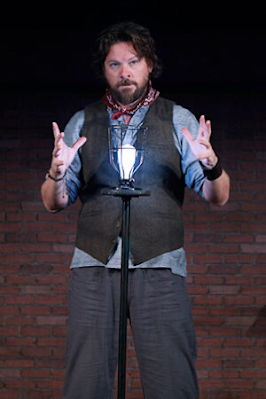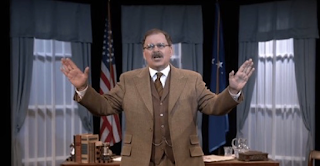RICHARD BAIRD’S TOUR DE FORCE OF HOMER’S “AN ILIAD” A DANCE TO REMEMBER
To quote Bertrand Russell “War does not determine who is right- only who is left”.
Imagine wandering around the world telling the same story, singing the same song for three thousand years? Now imagine how tiring it must be after pouring your heart out telling this story, this tale of woe, only to see history repeating itself as though no one is paying attention? Finally, imagine that story/song is Homer’s “The Iliad” and The Trojan Wars that go on and on between two great warriors-Achilles and Hector? Or closer to home, imagine it the Revolutionary War, The Civil War or WWI, WWII, Viet Nam, or Iraq, Iran or Afghanistan?
 |
| Richard Baird |
Like the ongoing wars, this one person tour-de-force performance isn’t the first out of the chute, not this particular rendition, anyway. This adaptation by Lisa Peterson and Denis O’Hare has been produced here three times. Yours truly has seen one other several years ago. Peterson and O’Hare won the 2012 Obie and Lucille Lortel awards for this epic piece. It is their adaptation as translated by Robert Fagles, of the ancient war of the Trojans told in a contemporary tongue and tone and performed by Baird the lone storyteller.
A recent interview in the U.T. noted that director David Ellenstein had also seen the same production. It was about eight years ago that the idea of casting Richard Baird, actor extraordinaire, in the role of The Poet, wanderer, and every other character mentioned in Homer’s “The Iliad”.
It paid of in spades.
 |
| Amanda Schaar with Richard Baird |
Sometimes when the timing is just right, and all the stars are aligned, patience becomes a virtue. And so was the case with North Coast Artistic director David Ellenstein and Richard Baird in this beautifully and hauntingly choreographed dance between the Poet, his Muse (Amanda on cello playing original music for the piece) all the warriors; Hector, Priam, Achilles, the husbands, the gods, children of the warriors, wives and every other character.
Baird enters a pretty bare theatre space (Marty Burnett, with props by Phillip Korth) fittingly, not far from the ocean. He takes off his hat, sets down his suitcase and begins his narrative.
“What drove them to fight with such a fury?” the narrator asks as he begins the tale. “Oh ... the gods, of course .... Um ... pride, honor, jealousy ... Aphrodite ... some game or other, an apple, Helen being more beautiful than somebody — it doesn’t matter. The point is, Helen’s been stolen, and the Greeks have to get her back.” “
According to our narrator they had to fight…the gods, of course were angered. The leader, Agamemnon took the spoils of war-this gorgeous15-year-old Helen, Apollo’s daughter and the Greeks had to get her back. But getting her back wasn’t as easy as it looked and so battles rage and men die and leaders hold on to their pride their honor and war prevails. After all, one doesn’t quit in the middle.
The dance begins with a nod from the muses. For ninety minutes he tells us of how it was from a first handed look. He has to because someone must bear witness, not to just to these wars but to all wars that carried men from all points of the world, Nebraska, South Dakota, twangy boys of Memphis, San Diego, Palo Alto; “nine years like a game of tug of war, fighting and nothing to show for it… they’ve forgotten why they’re fighting”.
 |
| Richard Baird |
With Baird’s inimitable acting prowess, we travel the highs and lows of war ravaged worlds. His is a delicate balance of rage, sorrow, disgust, passion, a sense of urgency, irony, questioning Homer’s world with the modern world of endless wars. The narrative seems to come easy even as he shouts out a few lines of Greek trying to remember when he first told the story and asking the muses to help him with his memory.
If war is the major topic of the night, Baird, who at the center, makes a compelling case against it. By taking one of the oldest wars in history and connecting the dots (kind of) to every other war in history has to give one pause, one would hope, that countries be a little more cautious, less blasé about solving every conflict with swords and guns, cannons and bombs, IUD’S and missiles.
If compelling theatre is in the stars for you, I give it two thumbs up.
And yes, “Imagine all the people living in peace”.
See you, virtually, at the theater,
Cinematographer/ Editor and Photographer: Aaron Rumley
“An Iliad” will be Streaming December 9, 2020– January 24, 2021.































